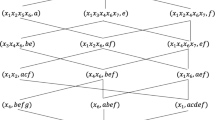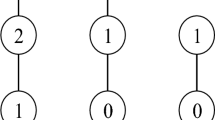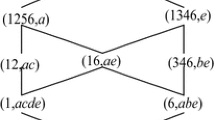Abstract
Formal concept analysis (FCA) has been applied to many fields as an effective tool for data analysis and knowledge discovery. In fact, the problem of obtaining a concept lattice of appropriate complexity and size is one of the most important problems of FCA. In this paper, based on a kind of Galois connection via a concept of inclusion degree using a special neighborhood system, we propose a multi-scaled concept lattice. The presented method can effectively reduce the number of concepts, while conserving the main formal structure. A formal context can be converted into an induced context through a kind of inclusion degree which is used to cope with a special covering of the objects set. Moreover, we show that the concept lattice produced by the original context is equal to the concept lattice produced by the induced context. Finally, the multi-scaled concept lattice determined by an inclusion degree is constructed from the induced context.




Similar content being viewed by others
Explore related subjects
Discover the latest articles, news and stories from top researchers in related subjects.References
Wille R (1982) Restructuring lattice theory: an approach based on hierarchies of concepts. In: Rival I (ed) Ordered Sets. Reidel, Dordrecht, pp 445–470
Ganter B, Wille R (1999) Formal concept analysis: mathematical foundations. Springer, Berlin
Godin R (1995) Incremental concept formation algorithm based on Galois (concept) lattices. Comput Intell 11(2):246–267
Wille R (2002) Why can concept lattices support knowledge discovery in databases. J Exp Theor Artif Intell 14(2–3):81–92
Kuznetsov SO, Obiedkov SA (2002) Comparing performance of algorithms for generating concept lattices. J Exp Theor Artif Intell 14:189–216
Krajca P, Outrata J, Vychodil V (2010) Parallel algorithm for computing fixpoints of Galois connections. Ann Math Artif Intel 59:257–272
Yao YY (2004) A comparative study of formal concept analysis and rough set theory in data analysis. In: Proceedings of 4th international conference on rough sets and current trends in computing, Uppsala, pp 59–68
Wang LD, Liu XD (2008) Concept analysis via rough set and AFS algebra. Inf Sci 178:4125–4137
Li JH, Mei CL, Cherukuri AK, Zhang X (2013) On rule acquisition in decision formal contexts. Int J Mach Learn Cybern 4:721–731
Shao MW, Yang HZ (2013) Two kinds of multi-level formal concepts and its application for sets approximations. Int J Mach Learn Cybern 4:621–630
Snelting G (1996) Reengineering of configurations based on mathematical concept analysis. ACM Trans Softw Eng Methodol 5(2):146–189
Carpineto C, Romano G (2004) Exploiting the potential of concept lattices for information retrieval with CREDO. J Univers Comput Sci 10(8):985–1013
Formica A (2006) Ontology-based concept similarity in formal concept analysis. Inf Sci 176:2624–2641
Mi JS, Liu J, Xie B (2008) Multi-scaled concept lattices. IEEE GrC, pp 54–58
Zhu W (2009) Relationship between generalized rough sets based on binary relation and cover ing. Inf Sci 179(3):210–225
Yao YY (2006) Neighborhood systems and approximate retrieval. Inf Sci 176:3431–3452
Stumme G, Taouil R, Bastide Y et al (2002) Computing iceberg concept lattices with TITANIC. Data Knowl Eng 42:189–222
Waiyamai K, Lakhal L (2000) Knowledge discovery from very large databases using frequent concept lattices. In: 11th Eur. Conf. on machine learning, ECML’ 2000, pp 437–445
Wei L, Qi JJ, Zhang WX (2008) Attribute reduction theory of concept lattice based on decision formal contexts. Sci China Ser F Inf Sci 51(7):910–923
Mi JS, Wu WZ, Zhang WX (2004) Approaches to knowledge reduction based on variable precision rough sets model. Inf Sci 159(3–4):255–272
Mi JS, Wu WZ, Zhang WX (2010) Approaches to attribute reduction in concept lattices induced by axialities. Knowl Based Syst 23(6):504–511
Li JH, Mei CL, Lv YJ (2011) A heuristic knowledge-reduction method for decision formal contexts. Comput Math Appl 61(4):1096–1106
Pernelle N, Rousset MC, Soldano H, Ventos V (2002) Zoom: a nested Galois lattices-based system for conceptual clustering. J Exp Theor Artif Intell 14:157–187
Ventos V, Soldano H (2005) Alpha Galois lattices: an overview. In: Ganter B, Godin R (eds) ICFCA 2005, LNAI, vol 3403, pp 299–314
Liu M, Shao MW, Zhang WX, Wu C (2007) Reduction method for concept lattices based on rough set theory and its application. Comput Math Appl 53(9):1390–1410
Wu WZ, Leung Y, Mi JS (2009) Granular computing and knowledge reduction in formal contexts. IEEE Trans Knowl Data Eng 21(10):1461–1474
Xu ZB, Liang JY, Dang CY, Chin KS (2002) Inclusion degree: a perspective on measures for rough set data analysis. Inf Sci 141:227–236
Wu WZ, Leung Y, Xu P (2007) Uncertainty reasoning based on inclusion degree. Tsinghua University Press, China
Ganter B, Stumme G, Wille R (2005) Formal concept analysis, foundations and applications. Springer, Berlin
Zhang WX, Qiu GF (2005) Uncertain decision making based on rough sets. Tsinghua University Press, Beijing
Zhang WX, Yao YY, Leung Y (2006) Rough set and concept lattice. Xi’an Jiaotong University Press, Xi’an
SM Dias, NJ Vieira (2015) Concept lattices reduction: definition, analysis and classification. Expert Syst Appl 42(20):7084–7097
Ch AK, Dias SM, Vieira NJ (2015) Knowledge reduction in formal contexts using non-negative matrix factorization. Math Comput Simul 109:46–63
Shao MW, Yang HZ, Wu WZ (2014) Knowledge reduction in formal fuzzy contexts. Knowl Based Syst 73:265–275
Kumar CA, Srinivas S (2010) Concept lattice reduction using fuzzy k-means clustering. Expert Syst Appl 37(3):2696–2704
Singh PK, Cherukuri AK, Li J (2015) Concepts reduction in formal concept analysis with fuzzy setting using Shannon entropy. Int J Mach Learn Cybern 6(1):1–11
Sarmah AK, Hazarika SM, Sinha SK (2015) Formal concept analysis: current trends and directions. Aritif Intell Rev 44(1):47–86
Zadeh LA (1965) Fuzzy Sets. Inf Control 8(65):338–353
Chen Y, Wu K, Chen X, Tang C, Zhu Q (2014) An entropy-based uncertainty measurement approach in neighborhood systems. Inf Sci 279:239–250
Acknowledgments
The authors would like to thank the anonymous reviewers for their helpful and constructive comments which helped to enhance the presentation of this paper. This work was supported by Grants from the National Nature Science Foundation of China (Nos. 61573127, 61300153 and 61502144) the Natural Science Foundation of Hebei Province of PR China (No. A2014205157, A2013208175), the Science Foundation of Hebei Education Department of PR China (No. Q2012093), and by Training Program for Leading Talents of Innovation Teams in the Universities of Hebei Province (LJRC022).
Author information
Authors and Affiliations
Corresponding author
Rights and permissions
About this article
Cite this article
Ma, L., Mi, JS. & Xie, B. Multi-scaled concept lattices based on neighborhood systems. Int. J. Mach. Learn. & Cyber. 8, 149–157 (2017). https://doi.org/10.1007/s13042-016-0521-3
Received:
Accepted:
Published:
Issue Date:
DOI: https://doi.org/10.1007/s13042-016-0521-3




